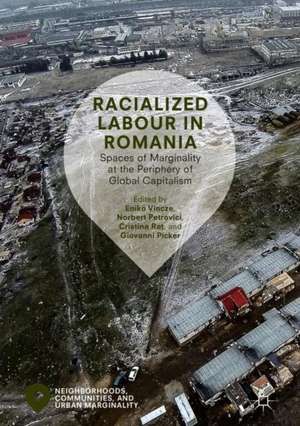Racialized Labour in Romania: Spaces of Marginality at the Periphery of Global Capitalism: Neighborhoods, Communities, and Urban Marginality
Editat de Enikő Vincze, Norbert Petrovici, Cristina Raț, Giovanni Pickeren Limba Engleză Hardback – 15 iun 2018
| Toate formatele și edițiile | Preț | Express |
|---|---|---|
| Paperback (1) | 579.84 lei 43-57 zile | |
| Springer International Publishing – 11 feb 2019 | 579.84 lei 43-57 zile | |
| Hardback (1) | 645.47 lei 43-57 zile | |
| Springer International Publishing – 15 iun 2018 | 645.47 lei 43-57 zile |
Preț: 645.47 lei
Preț vechi: 759.37 lei
-15% Nou
Puncte Express: 968
Preț estimativ în valută:
123.53€ • 128.63$ • 104.40£
123.53€ • 128.63$ • 104.40£
Carte tipărită la comandă
Livrare economică 10-24 martie
Preluare comenzi: 021 569.72.76
Specificații
ISBN-13: 9783319762722
ISBN-10: 3319762729
Pagini: 195
Ilustrații: XV, 233 p. 34 illus., 28 illus. in color.
Dimensiuni: 148 x 210 mm
Greutate: 0.56 kg
Ediția:1st ed. 2019
Editura: Springer International Publishing
Colecția Palgrave Macmillan
Seria Neighborhoods, Communities, and Urban Marginality
Locul publicării:Cham, Switzerland
ISBN-10: 3319762729
Pagini: 195
Ilustrații: XV, 233 p. 34 illus., 28 illus. in color.
Dimensiuni: 148 x 210 mm
Greutate: 0.56 kg
Ediția:1st ed. 2019
Editura: Springer International Publishing
Colecția Palgrave Macmillan
Seria Neighborhoods, Communities, and Urban Marginality
Locul publicării:Cham, Switzerland
Cuprins
1. Introduction: Racialized Labour of the Dispossessed as an Endemic Feature of Capitalism.- 2. Working Status in Deprived Urban Areas and their Greater Economic Role.- 3. Ghettoization: The Production of Marginal Spaces of Housing and the Reproduction of Racialized Labour.- 4. Social Citizenship at the Margins.- 5. Framing the "Unproductive”: A Case Study of High-Level Visions of Economic Progress and Racialized Exclusion.- 6. Segregated Housing Areas and the Discursive Construction of Segregation in the News.- 7. How Many Ghettos Can We Count? Identifying Roma Neighbourhoods in Romanian Municipalities.- 8. Conclusion: (Re)centring Labour, Class and Race.-
Notă biografică
Enikő Vincze is Professor in the Faculty of European Studies at Babeș-Bolyai University, Romania
Norbert Petrovici is Lecturer in the Sociology Department at Babeș-Bolyai University, Romania
Cristina Raţ is Lecturer in the Sociology Department at Babeș-Bolyai University, Romania
Giovanni Picker is Marie Skłodowska-Curie Senior Researcher in the School of Social Policy, University of Birmingham, UK
Norbert Petrovici is Lecturer in the Sociology Department at Babeș-Bolyai University, Romania
Cristina Raţ is Lecturer in the Sociology Department at Babeș-Bolyai University, Romania
Giovanni Picker is Marie Skłodowska-Curie Senior Researcher in the School of Social Policy, University of Birmingham, UK
Textul de pe ultima copertă
This book critically examines the making and persistence of impoverished areas at the margins of Romanian cities since the late 1980s. Through their historical outlook on political economy and social policy, combined with media and discourse analysis, the eight essays of Racialised Labour in Romania forge new and cutting-edge perspectives on how social class formation, spatial marginalization and racialisation intersect. The empirical focus on cities and the labour and the plight of the Roma in Central and Eastern Europe provides a vantage point for establishing connections between urban and global peripheries, and for reimagining the global order from its margins. The book will appeal to scholars, students, journalists and policy makers interested in Labour; Race and Ethnicity; Cities; Poverty; Social Policy; Political Economy and European Studies.
Caracteristici
Explores how processes of precarization and social-spatial polarization constitute endemic features of capitalism Reveals how a category of racialized labourers have been produced and confined within stigmatized spaces of marginality Analyses the inequalities faced by the Roma and other racialized precarious workers and how it shapes labour and class within peripheral regions of Central and Eastern Europe








